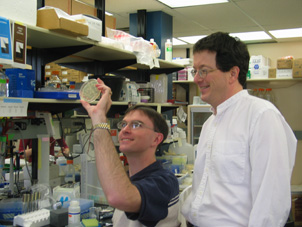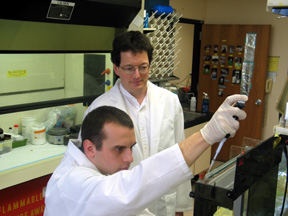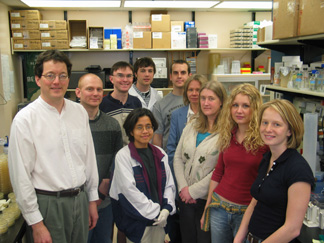 |
Bob Lahue, Ph.D., right, with Brian Farrell, one of his graduate students. |
It starts with his name – he prefers Bob, not Robert – and extends to all he does as a cancer researcher and teacher of graduate students at UNMC’s Eppley Institute for Research in Cancer and Allied Diseases.
Dr. Lahue, who is an associate professor at the Eppley Institute, is one of four faculty members being honored with the UNMC Outstanding Teaching Award at the Annual Faculty Meeting. The meeting will begin at 4 p.m. Tuesday, April 20, in the Suzanne & Walter Scott Auditorium in the Durham Research Center.
“Bob’s door is always open, and whether he is busy working on a grant or writing a manuscript, he will always take the time to answer questions or help with complex concepts,” said Michael Dixon, Ph.D., one of Dr. Lahue’s former graduate students who now works in UNMC’s Intellectual Property Office. “I think you would be hard-pressed to find a professor that cared more about students or had more to offer than Bob.”
Dr. Lahue currently serves as mentor for four graduate students. In addition, he is director of Eppley’s Cancer Research Training Program (CRTP), which prepares graduate students, M.D./Ph.D. students, postdoctoral fellows and summer undergraduates for careers in cancer research.
 |
Graduate student Dave Razidlo works on an experiment as Bob Lahue, Ph.D., looks on. |
A native of Hamilton, N.Y., Dr. Lahue is the first member of his family to pursue a career in science. “I always enjoyed science,” he said. “Science is like doing puzzles. Mother Nature gave us this puzzle. I enjoy putting the pieces together.”
After completing his postdoctoral training at Duke University, Dr. Lahue served on the faculty at the University of Massachusetts Medical Center for seven years before joining the Eppley Institute in 1997. His expertise lies in cancer genetics and how DNA repair is linked to cancer.
Everyone’s DNA is damaged by normal chemical reactions that can’t be avoided, Dr. Lahue said. DNA repair helps the cell restore its DNA back to normal.
“We study a DNA repair pathway that is a genetic spellchecker,” he said. “They keep the DNA in order. Some people lack defined DNA repair pathways. If these pathways don’t work right, they can make people more prone to develop cancer.”
Teaching students the intricacies of DNA repair can be difficult, but Dr. Lahue relishes the challenge. He strives to make his lectures interesting and thought provoking and uses humor (most of it self-deprecating) to get his points across. For every hour of lecture, he spends about 12 hours in preparation.
 |
From left to right: Bob Lahue, Ph.D., with graduate students Tony Mertz, Brian Farrell, Evan Pike, Dave Razidlo, Saumitri Bhattacharyya, Debbie Sommer, Claudia Borgeson, Tasha Collins and Danielle Daee. |
One way that Dr. Lahue involves his students is by making them read articles from current scientific journals. When they get to class, he randomly pulls names from a hat, then asks the students to answer questions pertaining to these articles.
“It teaches students to be prepared,” said Brian Farrell, one of Dr. Lahue’s graduate students, “but more than that, it helps equip the students with the skills they will need in a career of lifelong learning.”
Dr. Lahue has had 25 research articles published in scientific journals and currently has two active grants from the National Institutes of Health totaling more than $1.2 million.
His wife, Elaine, is an assistant professor of biology at the University of Nebraska at Omaha. The couple has a three-year-old daughter, Rita.